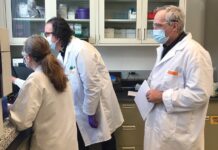A Westerly company says it has nearly completed the installation of equipment for making biodiesel. And, with a process to make biodiesel from soybean oil, the facility may be the first of its kind in Rhode Island.
R. Philip Mason, of the newly incorporated Mason Biodiesel, said his project to install biodiesel-making equipment in an existing building at 12 Gavitt Ave. in Westerly could be completed as early as mid-October. Once in operation, he said, the company will produce 2.5 million gallons of biodiesel per year.
The operation will be small compared with existing biodiesel refineries in the Midwest and elsewhere that produce tens of millions of gallons per year, yet Mason said his company will focus on quality rather than quantity.
“We’re not going to be one of the big boys,” said Mason, 47, who is also the owner of several Service Master property restoration franchises in Rhode Island and Connecticut. The new biodiesel business is a joint venture between him and one of his sons, Ryan Mason. Another son, Tyler Mason, who studied physics at the University of Rhode Island, is serving as technical adviser to the operation.
Philip Mason said most of his biodiesel will be available for sale in the Ocean State in its pure form, but nearly half will be shipped to a fuel company in White River Junction, Vt. The other company will combine his pure biodiesel with petroleum-based diesel to make B20, a mix of 20 percent biodiesel and 80 percent regular diesel, he said.
B20 typically can be used in any conventional diesel vehicle, without requiring engine modifications, according to the U.S. Department of Energy. The department adds that such engines, when burning biodiesel, emit less of the carbon dioxide that “scientists believe … is one of the main greenhouse gases contributing to global warming.”
Supporters of biodiesel and other alternative fuels, such as ethanol, say the homegrown energy reduces the nation’s dependence on foreign oil, and using alternative fuels supports U.S. farmers who grow the raw materials used to make the alternative fuels.
Last year, Congress adopted the Energy Policy Act of 2005, which gives tax credits and other incentives to users and producers of renewable energy. In fact, the law gives operations such as Mason’s 10 cents for every gallon of biodiesel they produce, up to a limit of 15 million gallons.
“That’s what makes it feasible to stay competitive with conventional diesel,” said Mason, adding that B20 sells for about 5 cents more per gallon than pure petroleum diesel. He plans to have the soybean oil for his biodiesel process shipped to the state by train and delivered to his plant by truck.
Mason said his project got under way in July, when he received the equipment to make biodiesel from a company called BioKing, based in the Netherlands. He leased holding tanks from Real Lease, of Rochester, N.Y., and took out a U.S. Small Business Administration-backed loan from The Washington Trust Co. in Westerly, for additional financing.
He declined to disclose the financial details of the project.
The National Biodiesel Board, an industry-backed based in Jefferson City, Mo., reported that its records show Mason’s project is the only biodiesel-making operation in the state. Still, other firms are said to be interested in building plants here.
After his Westerly operation gets off the ground, the elder Mason said, he would like to start another biodiesel venture, in Vermont, where he can make the fuel out of oil from rapeseeds grown by local farmers. He has already become involved with the Vermont Biofuels Association, a group formed in 2003 to promote biodiesel and renewable energy.
“Sure, [this business] can make money,” he said. “We wouldn’t be doing it if it didn’t make money.”












